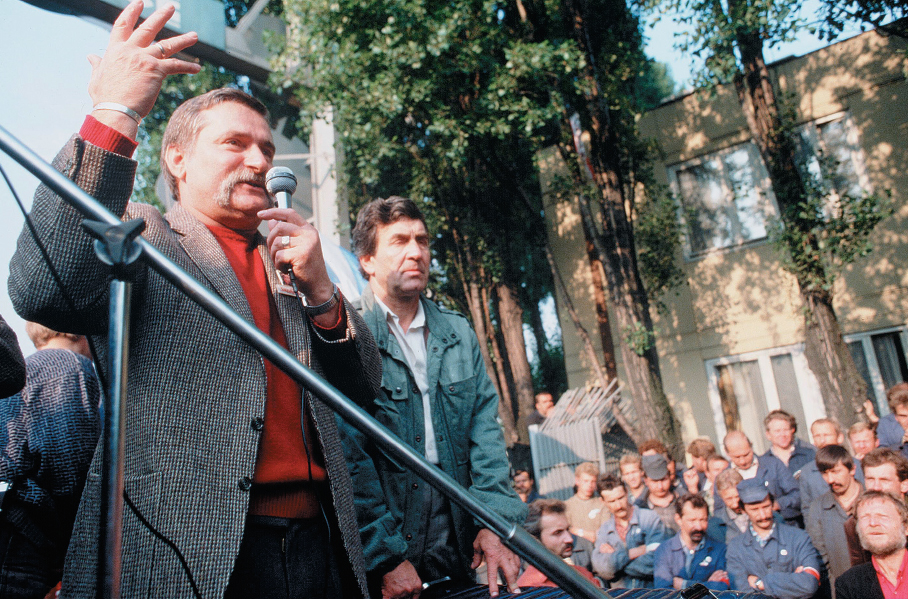Dissent in Czechoslovakia and Poland
Stagnation in the East Bloc encouraged small numbers of dedicated people to try to change society from below. Developments in Czechoslovakia and Poland were the most striking and significant, and determined protest movements re-emerged in both countries in the mid-1970s.
In Czechoslovakia a small group of citizens, including future Czechoslovak president Václav Havel (VAH-slahf HAH-vuhl) (1936–2011), signed a manifesto in 1977 that came to be known as Charter 77. The group criticized the government for ignoring the human rights provision of the Helsinki Accords and called on Communist leaders to respect civil and political liberties. They also criticized censorship and argued for improved environmental policies. Despite immediate state repression, the group challenged passive acceptance of Communist authority and voiced public dissatisfaction with developed socialism.
In Poland the Communists had failed to dominate society to the extent seen elsewhere in the East Bloc. Most agricultural land remained in private hands, and the Catholic Church thrived. The Communists also failed to manage the economy effectively. The 1960s brought stagnation, and in 1970, Poland’s working class rose again in angry protest. A new Communist leader came to power, and he wagered that massive inflows of Western capital and technology, especially from rich and now-friendly West Germany, could produce a Polish economic miracle. Instead, bureaucratic incompetence and the first oil shock in 1973 sent the economy into a nosedive. Workers, intellectuals, and the church became increasingly restive.
In August 1980, strikes broke out across Poland; at the gigantic Lenin Shipyards in Gdansk, sixteen thousand workers laid down their tools and occupied the plant. As other workers joined “in solidarity,” the strikers advanced the ideals of civil society, including the right to form trade unions free from state control, freedom of speech, release of political prisoners, and economic reforms. After the strikers occupied the shipyard for eighteen days, the government gave in and accepted the workers’ demands in the Gdansk Agreement. In a state in which the Communist Party claimed to rule on behalf of the proletariat, a working-class revolt had won an unprecedented, even revolutionary, victory.
Led by feisty Lenin Shipyards electrician and devout Catholic Lech Wałęsa (lehk vah-WEHN-suh) (b. 1943), the workers proceeded to organize a free and democratic trade union called Solidarity. Joined by intellectuals and supported by the Catholic Church, Solidarity became a national union with a full-time staff of 40,000 and 9.5 million members. Cultural and intellectual freedom blossomed in Poland, and Solidarity enjoyed tremendous public support. But Solidarity’s leaders pursued a self-limiting revolution, meant only to defend the concessions won in the Gdansk Agreement. Solidarity thus practiced moderation, refusing to challenge directly the Communist monopoly on political power. At the same time, the ever-present threat of calling a nationwide strike gave them real leverage in ongoing negotiations with the Communist bosses.

Lech Wałęsa and SolidarityAn inspiration for fellow workers at the Lenin Shipyards in the dramatic and successful strike against the Communist bosses in August 1980, Wałęsa played a key role in Solidarity before and after it was outlawed. Speaking here to old comrades at the Lenin Shipyards after Solidarity was again legalized in 1988, Wałęsa personified an enduring opposition to Communist rule in eastern Europe. (© Georges Merrillon/GAMMA)
Solidarity’s combination of strength and moderation postponed a showdown, as the Soviet Union played a waiting game of threats and pressure. After a confrontation in March 1981, Wałęsa settled for minor government concessions, and Solidarity dropped plans for a massive general strike. Criticism of Wałęsa’s moderate leadership gradually grew, and Solidarity lost its cohesiveness. The worsening economic crisis also encouraged radical actions among disgruntled Solidarity members, and the Polish Communist leadership shrewdly denounced the union for promoting economic collapse and provoking a possible Soviet invasion. In December 1981, Wojciech Jaruzelski (VOY-chehk yahr-oo-ZEHL-skee), the general who headed Poland’s Communist government, suddenly proclaimed martial law and arrested Solidarity’s leaders.
Outlawed and driven underground, Solidarity survived in part because of the government’s unwillingness (and probably its inability) to impose full-scale terror. Moreover, millions of Poles decided to continue acting as if they were free. Cultural and intellectual life remained extremely vigorous as the Polish economy continued to deteriorate. Thus popular support for outlawed Solidarity remained strong under martial law in the 1980s, preparing the way for the union’s political rebirth toward the end of the decade.
The rise and survival of Solidarity showed that ordinary Poles would stubbornly struggle for greater political and religious liberty, cultural freedom, trade-union rights, patriotic nationalism, and a more humane socialism. Not least, Solidarity’s challenge encouraged fresh thinking in the Soviet Union, ever the key to lasting change in the East Bloc.
